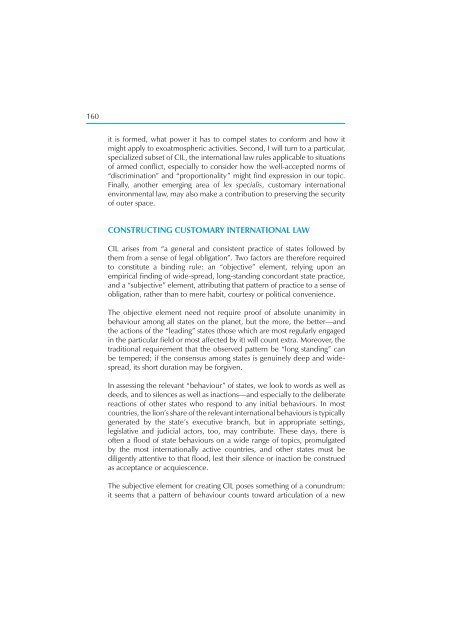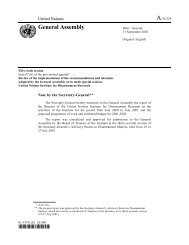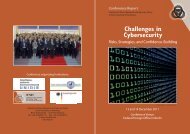Security in Space The Next Generation - UNIDIR
Security in Space The Next Generation - UNIDIR
Security in Space The Next Generation - UNIDIR
Create successful ePaper yourself
Turn your PDF publications into a flip-book with our unique Google optimized e-Paper software.
160<br />
it is formed, what power it has to compel states to conform and how it<br />
might apply to exoatmospheric activities. Second, I will turn to a particular,<br />
specialized subset of CIL, the <strong>in</strong>ternational law rules applicable to situations<br />
of armed confl ict, especially to consider how the well-accepted norms of<br />
“discrim<strong>in</strong>ation” and “proportionality” might fi nd expression <strong>in</strong> our topic.<br />
F<strong>in</strong>ally, another emerg<strong>in</strong>g area of lex specialis, customary <strong>in</strong>ternational<br />
environmental law, may also make a contribution to preserv<strong>in</strong>g the security<br />
of outer space.<br />
CONSTRUCTING CUSTOMARY INTERNATIONAL LAW<br />
CIL arises from “a general and consistent practice of states followed by<br />
them from a sense of legal obligation”. Two factors are therefore required<br />
to constitute a b<strong>in</strong>d<strong>in</strong>g rule: an “objective” element, rely<strong>in</strong>g upon an<br />
empirical fi nd<strong>in</strong>g of wide-spread, long-stand<strong>in</strong>g concordant state practice,<br />
and a “subjective” element, attribut<strong>in</strong>g that pattern of practice to a sense of<br />
obligation, rather than to mere habit, courtesy or political convenience.<br />
<strong>The</strong> objective element need not require proof of absolute unanimity <strong>in</strong><br />
behaviour among all states on the planet, but the more, the better—and<br />
the actions of the “lead<strong>in</strong>g” states (those which are most regularly engaged<br />
<strong>in</strong> the particular fi eld or most affected by it) will count extra. Moreover, the<br />
traditional requirement that the observed pattern be “long stand<strong>in</strong>g” can<br />
be tempered; if the consensus among states is genu<strong>in</strong>ely deep and widespread,<br />
its short duration may be forgiven.<br />
In assess<strong>in</strong>g the relevant “behaviour” of states, we look to words as well as<br />
deeds, and to silences as well as <strong>in</strong>actions—and especially to the deliberate<br />
reactions of other states who respond to any <strong>in</strong>itial behaviours. In most<br />
countries, the lion’s share of the relevant <strong>in</strong>ternational behaviours is typically<br />
generated by the state’s executive branch, but <strong>in</strong> appropriate sett<strong>in</strong>gs,<br />
legislative and judicial actors, too, may contribute. <strong>The</strong>se days, there is<br />
often a fl ood of state behaviours on a wide range of topics, promulgated<br />
by the most <strong>in</strong>ternationally active countries, and other states must be<br />
diligently attentive to that fl ood, lest their silence or <strong>in</strong>action be construed<br />
as acceptance or acquiescence.<br />
<strong>The</strong> subjective element for creat<strong>in</strong>g CIL poses someth<strong>in</strong>g of a conundrum:<br />
it seems that a pattern of behaviour counts toward articulation of a new








